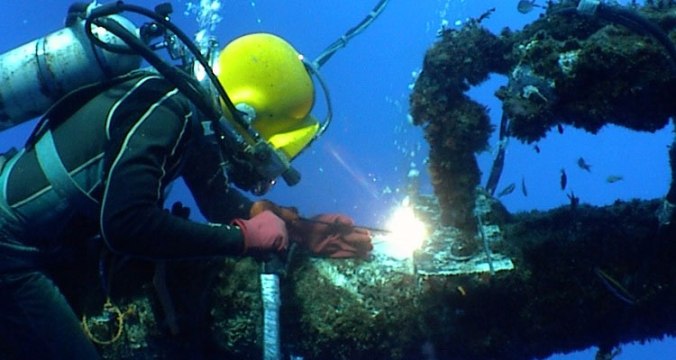A commercial diver is also known as an underwater welder who can do underwater welding jobs. It is considered as one of the dangerous jobs in the world and the diver should handle the underwater pressure. It was first invented by Konstantin Khernov in the year 1932. Today, this is an important line of work in the boat bottom cleaning company. This type of job is mostly on oil platforms, damaged ships and pipeline repair works.
Types of Commercial Diving Job
The underwater welder job is of two types. One is dry underwater welding and other one is wet underwater welding. The wet underwater welding takes place in direct contact with the water. The dry underwater welding is takes place in positive pressure chambered dry environment but it is also a type of underwater welding job. For a quality welding, wet underwater welding is preferred.

Difficulties in Commercial Diving
Addition to risks in normal diving, the main problem faced in this job is decompression sickness. This is due to direct expose to some ugly fatalities present inside the water. Another main significant issue is to expose directly to electric shocks. The electric shock happens a lot and it can be prevented by using professional welding equipment which are verified to work with underwater welding. Another issue is the risk of increase in the level of hydrogen and oxygen which are deadly explosives. Apart from that, many workers reported that their dental amalgam damage. Some divers have experienced inconstant taught inconsistent thoughts and muscular and skeletal deficiencies.
To a potential underwater welder, it is important to get rid of the common misconceptions that usually cloud that particular line of work. Despite these warnings, increasing number of divers are choosing this speciality due to the increase in availability of work and the ever evolving techniques involved. Many safety concerns are addressed before the welder begins work, the use of specially-designed water-proof electrodes for welding purposes ensures that you are not about to get grilled to death by electrocution. Other than that, the welding current used by most underwater welder jobs is relatively low.
The job of an underwater welder is both challenging and exciting. If you want to pursue a career as an underwater welder, then do yourself a favour and don’t get all wrapped up in worldly baseless conjectures. The training provided to you is more than adequate to enable you to be on the safe side all the time.